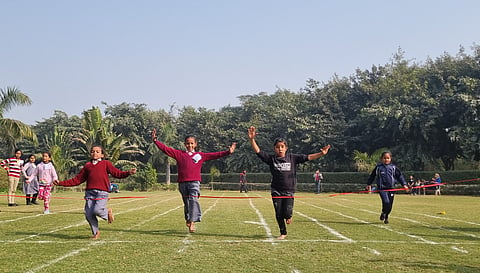

India’s education system has long been centered around rote learning, academic outcomes, and test scores for years — often neglecting the holistic development of children, especially in underserved communities and government schools.
But what if the playground could be just as powerful a classroom as the one with blackboards and books? What if sports were not just an extracurricular activity but a core part of how children learn, grow, and thrive?
While working with schools, Prashant Mishra, Rajnikant and Vijay Sharma identified the urgency of the need. To understand the problem in depth, they conducted a survey across 600 people. The data was really alarming:
> 80% of children were interested in sports but lack awareness and guidance
> 87% children lack basic sports amenities and separate sports teacher in their school
> 80% children lack access, exposure and opportunities to succeed in sports
> Most parents and teachers believe sports as a hobby, not as careers.
National and Global Data
> 80% of adolescents globally are physically inactive (WHO Report, 2022).
> NEP 2020, ASER 2024, NSP 2025 strongly promotes sports and physical education, yet only 17% of schools have a dedicated physical education teacher.
> 2 in 3 Indian children have an unhealthy BMI, indicating poor physical activity levels and well-being.
> 80% of youth lack sports career pathways and have no exposure even those with national level experience or degrees.
The result? Millions of children grow up without structured opportunities to play, develop essential life skills, or pursue sports as their careers. They are denied the chance to build collaboration, problem solving, critical thinking, resilience, and leadership — all 21st-century life skills that textbooks alone cannot teach.
Why Sports in School Matter
Sports are not a preference, they are a necessity for building life skills, well being and healthy lifestyle.
From a development perspective, sports directly enhance:
Physical health: improving fitness, reducing obesity, and ensuring overall well-being.
Mental health: reducing stress, building resilience, and boosting self-esteem.
Life skills: developing ownership, empathy, collaboration, and leadership.
Academic outcomes: children who engage in sports are often more motivated and excited to study.
In underserved communities, where children are often surrounded by barriers like poverty, violence, or lack of opportunities, sports can also be a powerful tool for social change. The playground becomes a safe space where they feel seen, valued, and capable of dreaming big.
Stories of Change
At Sportathon Foundation, these ideas come to life everyday.
Take Neeraj, a differently-abled child often left out of classroom activities. Through inclusive sports sessions, he not only participated but emerged as a leader, inspiring others to play with empathy and teamwork. Or Priyanshu, a government school student who discovered his passion for athletics through our program. With structured training, he secured 2nd place in the Delhi State Javelin Throw Competition — and Deepak, Yash and Durgesh secured place in District level Competition that shifted how the community perceived them and the power of sports.
Then there’s Rohit and Rajeev, Youth Captains trained under our Fellowship. Initially uncertain about their career, both gained confidence, facilitation skills, and leadership experience through the fellowship. Today, Rohit works as a Physical-Education teacher at Hamdard Public School, while Rajeev is employed with Sportathon as a coach. Both now serve as role models in their communities, proving that sports can be a pathway to sustainable livelihoods.
Each story reflects the larger truth: sports can open doors to health, confidence, careers, and identity.
Sportathon’s Model for Reimagining Education
To address these systemic gaps, Sportathon has designed a structured model:
Project CHAK DE – A school-based curriculum from early years to Grade 12, integrating motor skills, sports, life skills, and holistic development.
Sports for Impact Fellowship – Training passionate local youth as “Youth Captains” to become sports educators in schools, creating both impact for children and career pathways for youth.
Super 30 (Sports for Excellence) – Identifying talented children from schools and providing them high-performance training, nutrition, mental health support, and exposure to compete at district, state, and national levels.
Events & Exposure – Organizing in-house events and partnering with external organizations to provide competitions, marathons, and opportunities for children to showcase their skills.
These programs create a pipeline for integrating sports in education, access opportunities and creating livelihoods.
The Way Forward
If India wants to prepare its children for the future, sports must be integrated into the core of education. The government is recognising the problem and integrated sport In the National Education Policy (NEP) 2020, National Curriculum Framework (NCF) for School Education 2023, National Sports Policy (NSP) 2025 and Samagra Shiksha 2023. However we need to make the implementation strong. The need is urgent and the opportunity is massive.
By embedding structured sports and physical education in schools, we can:
Reduce health risks like obesity and inactivity.
Equip children with essential 21st-century life skills.
Create livelihoods and leadership opportunities for youth.
Build inclusive spaces where every child — regardless of gender, background, or ability — can play and thrive.
At Sportathon, we believe sports are not just about producing athletes. They are about producing healthier, happier, and more capable leaders. The playground, after all, can be the most powerful classroom of all.
[Article by Prashant Mishra, Co- Founder and CGO, Dil Se Khelo and Sportathon Foundation, Teach For India Alum]
